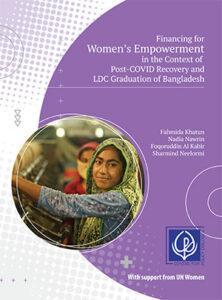 This research investigates the gendered impacts of recent crises, particularly the Least Developed Country (LDC) graduation, the COVID-19 pandemic, and geopolitical challenges, on women in Bangladesh. The evidence reveals a disproportionate toll, including increased unpaid care responsibilities, rising gender-based violence, unequal access to essential services, and diminished economic opportunities for women. Amid economic shocks and impending graduation from LDC status, the study emphasises the urgent integration of gender-related Sustainable Development Goals (SDGs) into recovery efforts.
This research investigates the gendered impacts of recent crises, particularly the Least Developed Country (LDC) graduation, the COVID-19 pandemic, and geopolitical challenges, on women in Bangladesh. The evidence reveals a disproportionate toll, including increased unpaid care responsibilities, rising gender-based violence, unequal access to essential services, and diminished economic opportunities for women. Amid economic shocks and impending graduation from LDC status, the study emphasises the urgent integration of gender-related Sustainable Development Goals (SDGs) into recovery efforts.
The economic challenges and graduation underscore the need for gender-responsive fiscal policies. The research calls for comprehensive data analysis to understand the gender-specific effects of fiscal measures, enabling targeted policies for women’s empowerment. Transparent budgeting with civic participation and tax reforms addressing gender biases is urged. The study recommends higher budget allocations for health, education, skills development, and social protection, highlighting the importance of aligning monetary policy tools with fiscal measures.
To address women’s economic hardships, the research proposes concessional financing schemes for private sector involvement aligned with SDG 5 and explores innovative financial models like blended financing and social impact bonds. Collaboration with stakeholders is deemed imperative for advancing gender equality in Bangladesh. The study concludes with key recommendations for the government to focus on financing women’s empowerment amidst these challenges.
Authors: Fahmida Khatun, Nadia Nawrin, Foqoruddin Al Kabir and Sharmind Neelormi
Publication Period: November 2023

